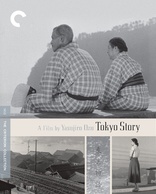Tokyo Story Blu-ray Movie
HomeTokyo Story Blu-ray Movie 
東京物語 / Tôkyô monogatari / Blu-ray + DVDCriterion | 1953 | 137 min | Not rated | Nov 19, 2013
Movie rating
8.5 | / 10 |
Blu-ray rating
| Users | 5.0 | |
| Reviewer | 4.5 | |
| Overall | 4.6 |
Overview
Tokyo Story (1953)
An aging couple journey to visit their grown children in bustling postwar Tokyo.
Starring: Chishû Ryû, Chieko Higashiyama, Setsuko Hara, Haruko Sugimura, Sô YamamuraDirector: Yasujirô Ozu
| Foreign | Uncertain |
| Drama | Uncertain |
| Melodrama | Uncertain |
Specifications
Video
Video codec: MPEG-4 AVC
Video resolution: 1080p
Aspect ratio: 1.33:1
Original aspect ratio: 1.37:1
Audio
Japanese: LPCM Mono (48kHz, 24-bit)
Subtitles
English
Discs
50GB Blu-ray Disc
Three-disc set (1 BD, 2 DVDs)
DVD copy
Playback
Region A (locked)
Review
Rating summary
| Movie | 5.0 | |
| Video | 4.0 | |
| Audio | 4.5 | |
| Extras | 4.5 | |
| Overall | 4.5 |
Tokyo Story Blu-ray Movie Review
Reviewed by Dr. Svet Atanasov October 19, 2013Japanese director Yasujiro Ozu's "Tôkyô monogatari" a.k.a. "Tokyo Story" (1953) arrives on Blu-ray courtesy of Criterion. The supplemental features on the disc include an original trailer; documentary film produced by Shochiku; documentary film directed by Kazuo Inoue; audio commentary with David Desser, editor of Ozu's "Tokyo Story"; and more. The release also arrives with an illustrated booklet featuring an essay by critic David Bordwell. In Japanese, with optional English subtitles for the main feature. Region-A "locked".
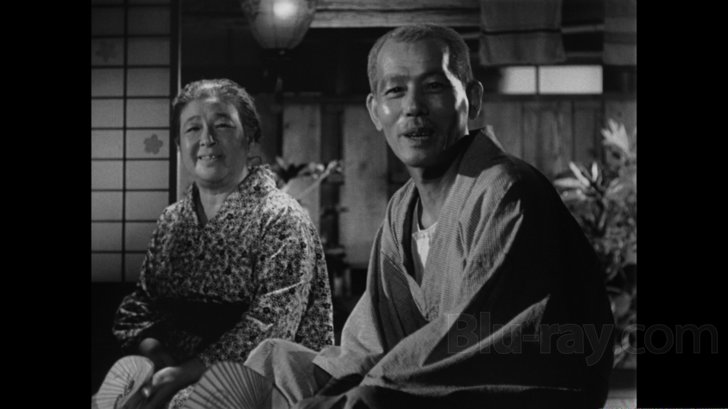
Shukishi and Tomi
In Japanese director Yasujiro Ozu’s Tokyo Story an elderly couple, Shukishi (Chishu Ryu, Akira Kurosawa’s Red Beard) and Tomi (Chieko Higashiyama, Magokoro), from the provincial town of Onomichi travels to Tokyo to visit their grown-up children who have not visited them in years. They know the type of careers their children have but are curious to see the families they have created.
Once Shukishi and Tomi arrive in Tokyo they quickly realize that their children have changed - Koichi has become a respected pediatrician but lost his sense of humor; Shige has become a successful beautician but is now obsessed with money. Shukishi and Tomi are also surprised to see how different life in Tokyo is compared to Onomichi.
The children send their parents to Atami Hot Springs – it costs less to have them there than at their homes. A few days later, Shukishi and Tomi decide that it is time to head back to Onomichi. Their widowed daughter-in-law, Noriko (Setsuko Hara, Akira Kurosawa’s The Idiot), is the only person who is genuinely saddened to hear that they are leaving.
On the way back, Tomi becomes seriously sick. Shukishi immediately informs the family and they all gather in Onomichi. Shortly after, Tomi passes away. No one is as concerned about Shukishi’s future as Noriko. Shige even mentions that she would have preferred to see her father pass away first. Eventually, everyone leaves.
Widely regarded as one of the greatest films ever made, Ozu’s Tokyo Story has not always been easy to see in the United States. Prior to Criterion’s DVD release, the only way to see Tokyo Story was via second-hand VHS copies. Nowadays, with a few exceptions, most of Ozu’s films are relatively easy to locate and purchase.
Tokyo Story is comprised of short episodes chronicling life in post-war Japan, and specifically the generational conflict between children and parents exacerbated by the country’s rapid industrialization. The key themes in Tokyo Story, however, are universal in nature.
There are hardly any traces of melodramatic cliches. Powerful climaxes are also missing. Throughout the film there are no attempts by Ozu to side with or blame any of the main protagonists either - the viewer is simply left to contemplate the motives behind their decisions.
The overwhelming majority of the time Ozu’s camera remains static, primarily at floor level, observing the main protagonists from afar. The occasional panoramic vistas from Tokyo are also notably serene. The dialog is fairly basic. Like most of Ozu’s films, Tokyo Story also has a consistent, slow pacing.
The cast is very good. Legendary Japanese actor Chishu Ryu, for instance, is outstanding as the wise Shukishi. There is something quite remarkable about the quiet and surprisingly relaxed manner in which he handles disappointment and pain. Setsuko Hara is also impressive as the young and disillusioned but respectful widow Noriko.
Note: In 1958, Tokyo Story was recognized with the Sutherland Trophy at the British Film Institute Awards.
Tokyo Story Blu-ray Movie, Video Quality 
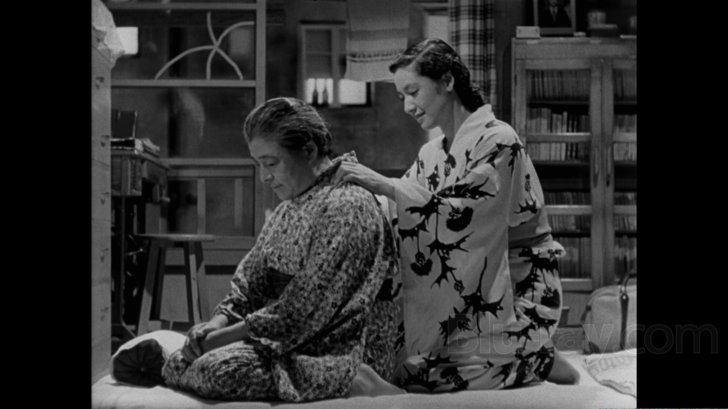
Presented in an aspect ratio of 1.33:1, encoded with MPEG-4 AVC and granted a 1080p transfer, Yasujiro Ozu's Tokyo Story arrives on
Blu-ray courtesy of Criterion.
The following text appears inside the booklet provided with this Blu-ray release:
"This new digital transfer was created in 4K resolution on an IMAGER XE scanner from a new 35mm interpositive. The original negative no
longer exists, so the new interpositive created for scanning was made from the internegative, the most original film element available. The
restoration project was undertaken by Shochiku Co., Ltd., and performed by Imagica Corp. and Imagica West Corp. in Japan, which received
additional support in the restoration process from Reliance MediaWorks in India.
Transfer supervisors: Masashi Chikamori, Takashi Kawamata.
Colorists: Osamu Iseki, Seiji Saito."
The areas that have benefited the most from the new 4K digital restoration of Tokyo Story are image and contrast stability. For
example, the various frame transition issues that are present on BFI's release are now either partially or fully addressed. Some of the extremely light edge shimmer is also
eliminated. Though contrast stability was not a serious issue on the BFI release, it is now also clearly better. Sharpness levels have also been
rebalanced. Blacks and whites have been toned down and rebalanced as well, while the grays appear better exposed. Surface noise has been
carefully removed, but grain has been retained as best as possible. There are areas where the grain is somewhat uneven, causing some
scenes to appear slightly softer, but image depth and stability remain pleasing. Problematic sharpening adjustments have not been performed.
Finally, the film now looks notably healthier. Indeed, virtually all of the flecks and small scratches that appear on the BFI release have been
removed. To sum it all up, I think that three years after the BFI release, the new digital restoration of Tokyo Story offers some
important improvements in image quality that clearly make Criterion's release the better option for collectors and casual fans of the film.
(Note: This is a Region-A "locked" Blu-ray release. Therefore, you must have a native Region-A or Region-Free PS3 or SA in order to
access its content).
Tokyo Story Blu-ray Movie, Audio Quality 

There is only one standard audio track on this Blu-ray release: Japanese LPCM 1.0. For the record, Criterion have provided optional English
subtitles for the main feature.
Clarity and depth are pleasing. Some additional stabilizations appear to have been performed and the background hiss present on the BFI
release toned down. As a result, the audio is now better rounded and overall better balanced. For the record, there are no serious distortions or
audio dropouts to report in this review. The English translation is very good.
Tokyo Story Blu-ray Movie, Special Features and Extras 
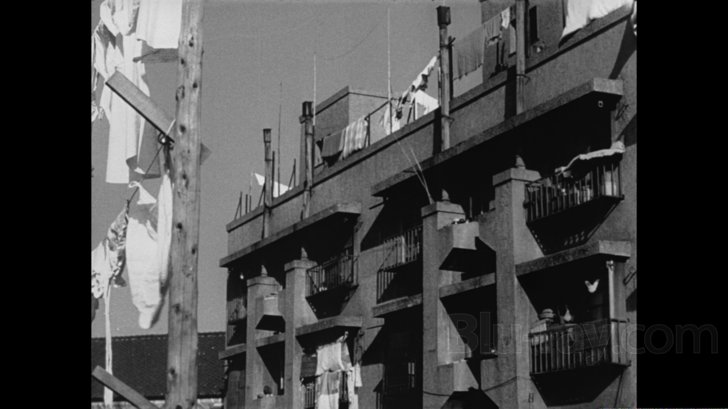
- Trailer - original trailer for Tokyo Story. In Japanese, with optional English subtitles. (5 min, 1080p).
- Talking with Ozu - this documentary film was produced by Shochiku for the ninetieth anniversary of director Yasujiro Ozu's birth in 1993. It in it acclaimed filmmakers Stanley Kwan, Aki Kaurismaki, Claire Denis, Lindsay Anderson, Paul Schrader, Wim Wenders, and Hou Hsiao-hsien recall their first experiences with the films of Yasujiro Ozu and explain what makes them unique and important. In English, Finnish, French, German, Japanese, Cantonese, and Mandarin, with optional English subtitles where necessary. (40 min, 1080i).
- I Lived, But... - this documentary film, directed by Kazuo Inoue in 1983, focuses on the life and legacy of the great
Japanese master. It features a number of interviews with actors, fellow directors, critics, and Ozu's older brother, Shinichi Ozu. In Japanese,
with optional English subtitles. (123 min, 1080p).
1. What does this nothingness mean?
2. Chishu Ryu
3. A brief history
4. First job
5. Ozu's film career begins
6. The student series
7. The Kihachi series
8. Fastidiousness
9. The Circle of life
10. "I can wait"
11. A Hen in the Wind
12. Late Spring
13. Early Summer
14. Ozu's mentors
15. Worldwide acclaim
16. Writing with Kogo Noda
17. Actors' reflections
18. Ozu and Edo tradition
19. Authenticity
20. A director and mentor
21. The shadow of death
22. A rigid framework
23. Alone
24. The gardener
25. Cancer
26. A full circle
- Chishu Ryu and Shochiku's Ofuna Studio - this documentary film from 1988 focuses on the life and career of the legendary Japanese actor Chishu Ryu, who frequently appeared in the film's of Yasujiro Ozu, and his work at Ofuna Studio. In Japanese, with optional English subtitles. (46 min, 1080p).
- Commentary - this audio commentary with David Desser, editor of Ozu's "Tokyo Story", was recorded exclusively for Criterion in 2003. It initially appeared on Criterion's DVD release of Tokyo Story.
- Booklet - illustrated booklet featuring an essay by critic David Bordwell.
Tokyo Story Blu-ray Movie, Overall Score and Recommendation 
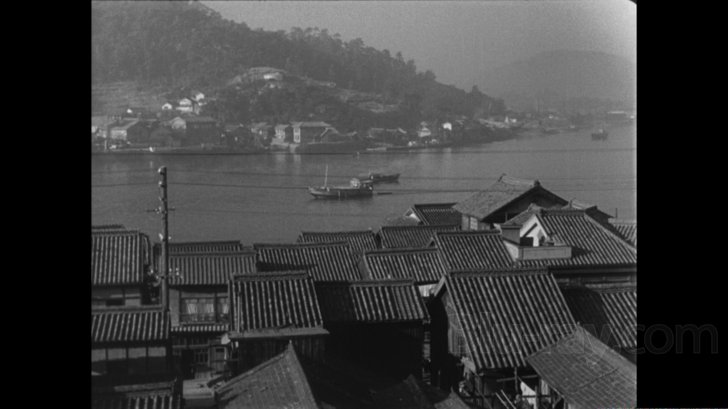
Folks who have been patiently waiting for Criterion to upgrade their DVD release of Japanese master Yasujiro Ozu's Tokyo Story after the BFI released it in the United Kingdom will be pleased with the studio's upcoming Blu-ray release. The new 4K digital restoration provides some important improvements in quality that clearly make Criterion's release the better option. As expected, all of the supplemental features from the DVD release have also been transferred to the Blu-ray release. VERY HIGHLY RECOMMENDED.
Similar titles
Similar titles you might also like

The Only Son
一人息子
1936

Early Summer
麥秋
1951

Late Spring
晩春 | 4K Restoration
1949

An Autumn Afternoon
秋刀魚の味 / Sanma no aji
1962

Equinox Flower
彼岸花
1958

Late Autumn
秋日和
1960

Good Morning
お早よう / Ohayô / + I Was Born, But... and A Straightforward Boy
1959

Yi Yi
2000

Ikiru
生きる
1952

Still Walking
歩いても 歩いても / Aruitemo aruitemo
2008

Sansho the Bailiff
山椒大夫 / Sanshô dayû
1954

Floating Weeds
浮草
1959

Harakiri
切腹 / Seppuku
1962

Persona
1966

Record of a Tenement Gentleman
長屋紳士録
1947

Bicycle Thieves
Ladri di biciclette
1948

The Traveler
مسافر | Remastered
1974

Early Spring
早春
1956

Wild Strawberries
Smultronstället
1957

There Was a Father
父ありき
1942
